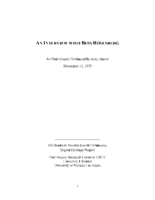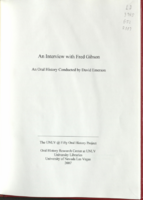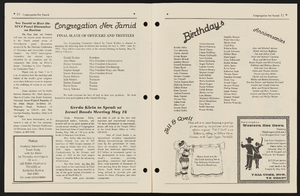Search the Special Collections and Archives Portal
Search Results

Floyd Jenne interview, April 4, 1976: transcript
Date
Archival Collection
Description
From the Ralph Roske Oral History Project on Early Las Vegas; OH-00944. On April 4, 1976, Gordon Brusso interviewed Floyd L. Jenne (born 1915). The interview discussed Boulder City McGill, as well as Nevada history.
Text

Transcript of interview with Thalia Dondero by Susan Scott, March 18, 1978
Date
Archival Collection
Description
On March 18, 1978, Susan Scott interviewed Thalia Dondero (born 1921 in Greeley, Colorado) about her experiences in Nevada and more specifically about her work as a Clark County Commissioner. Dondero first speaks about her background and the circumstances which led her to move to Las Vegas. She also talks about her children, her work with the Parent-Teacher Association, and her service with the Nevada State Park Commission. She also mentions some of her lobbying work for the development of state parks, including a project by National Geographic in which she visited multiple parks, and she later describes the development of the Las Vegas Strip. At the end of the interview, Dondero talks about her involvement in various organizations, her consideration for running for governor, and some of the topics she handles as a commissioner for the county.
Text

Transcript of interview with Linda Hartley by Pauline Marchese, March 10, 1978
Date
Archival Collection
Description
On March 10, 1978, Pauline Marchese interviewed her neighbor, Linda Hartley (born in 1941, in Cedar City, Utah) in her home at 5261 South Jane Way, Las Vegas, Nevada. During the interview, the two discuss Hartley’s personal history, such as schools that she had attended and her recollection of local recreational activities. The two go on to talk about changes in crime, the environment, and briefly discuss a variety of issues at the time, including: segregated schools, prostitution, and effects of the Nevada Test Site.
Text

Edith Leavitt interview, February 7, 1977: transcript
Date
Archival Collection
Description
On February 7, 1977, collector Enrico Messina interviewed Edith Leavitt (born April 12th, 1924, in St. George, Utah) at her home in Las Vegas, Nevada. In this interview, Mrs. Leavitt talks about teaching in Southern Nevada, including in the Virgin Valley and in Las Vegas. She also discusses the changing education system in Southern Nevada during her time as an educator.
Text

Transcript of interview with Bess Rosenberg by Jerry Masini, November 12, 1975
Date
Archival Collection
Description
Interview with Bess Rosenberg by Jerry Masini on November 12, 1975. In this interview, Rosenberg describes coming to Las Vegas in 1942, and the desert landscape. She gives an in-depth recollection of the first atomic test, and talks about different weather and the seasons in Las Vegas. Rosenberg describes several clubs and hotels around downtown and the recreation at Lake Mead and Mount Charleston.
Text

Transcript of interview with Walter Dane by Ann Clark, March 11, 1978
Date
Archival Collection
Description
On March 11, 1978, Ann K. Clark interviewed her step grandfather, tire repairman Walter Dane, (born August 10th, 1914 in West Barnett, Vermont) in her, the interviewer’s, home in North Las Vegas. Also present during the interview is the interviewer’s mother, Marie Dane. Walter relocated to Indian Springs in 1930 before settling in Las Vegas in 1943. In 1968 he moved to Utah, where he resided at the time of this interview. Well-traveled, Walter discusses his many moves over the years. Ultimately, this interview covers the growth and development of the Las Vegas and Indian Springs areas.
Text

Transcript of interview with Fred Gibson by David Emerson, February 13, 2008
Date
Archival Collection
Description
Text

Erma Linda Rivera oral history interview: transcript
Date
Archival Collection
Description
Oral history interview with Erma Linda Rivera conducted by Laurents Bañuelos-Benitez, Nathalie Martinez, Maribel Estrada Calderón, and Barbara Tabach on January 09, 2019 for the Latinx Voices of Southern Nevada Oral History Project. In this interview, Erma Linda Rivera discusses her early life as a grandchild of immigrants. She shares her experiences growing up in a mining town in Arizona. After marrying, both Erma Linda and her husband Jose became federal civil servants. This would lead Erma Linda Rivera to Las Vegas, Nevada in 1984. Prior to retirement, Rivera worked as an regional Equal Employment Opportunity manager. Rivera discusses her career working for the Department of the Interior, sharing how her job helped fuel her passion for social justice. Erma Linda relates the importance of civic involvement in her life. Finally, she reflects on how Henderson, Nevada has changed over the years she has lived there.
Text

